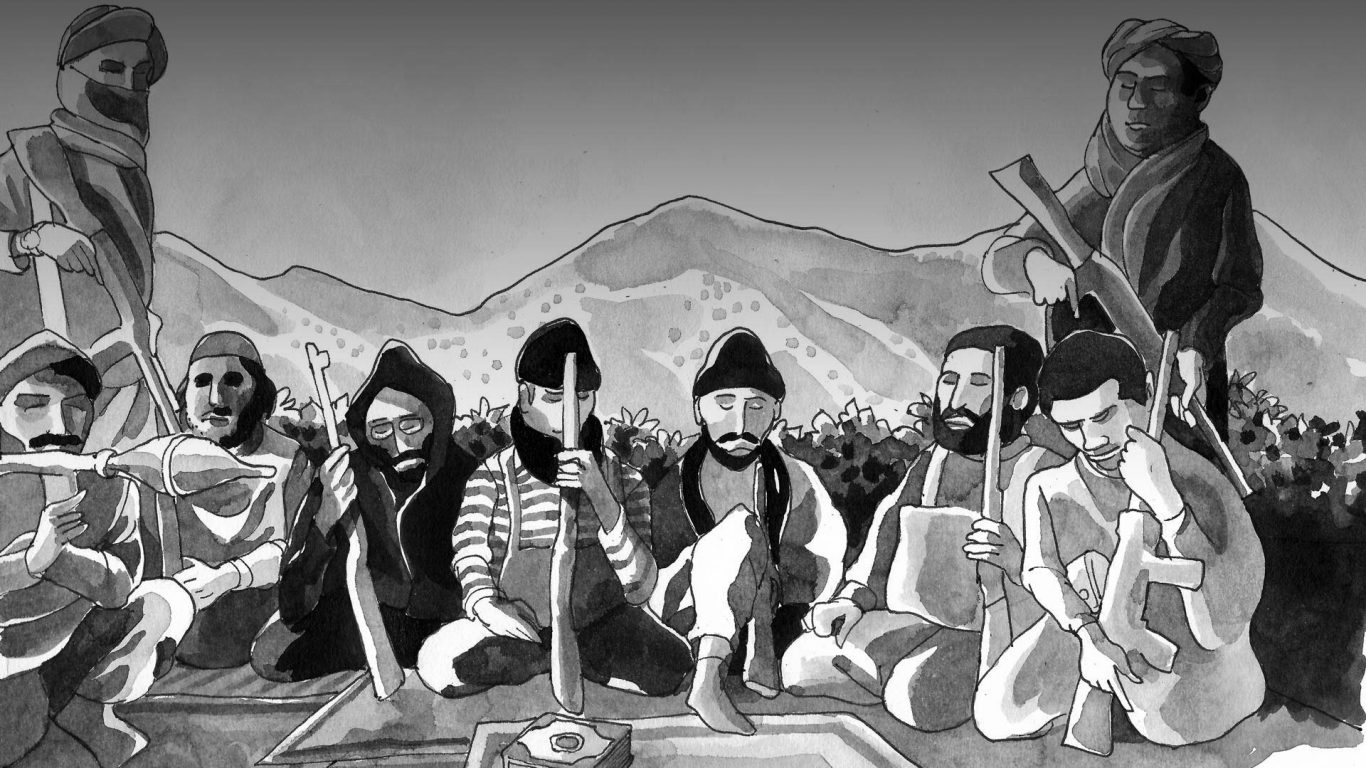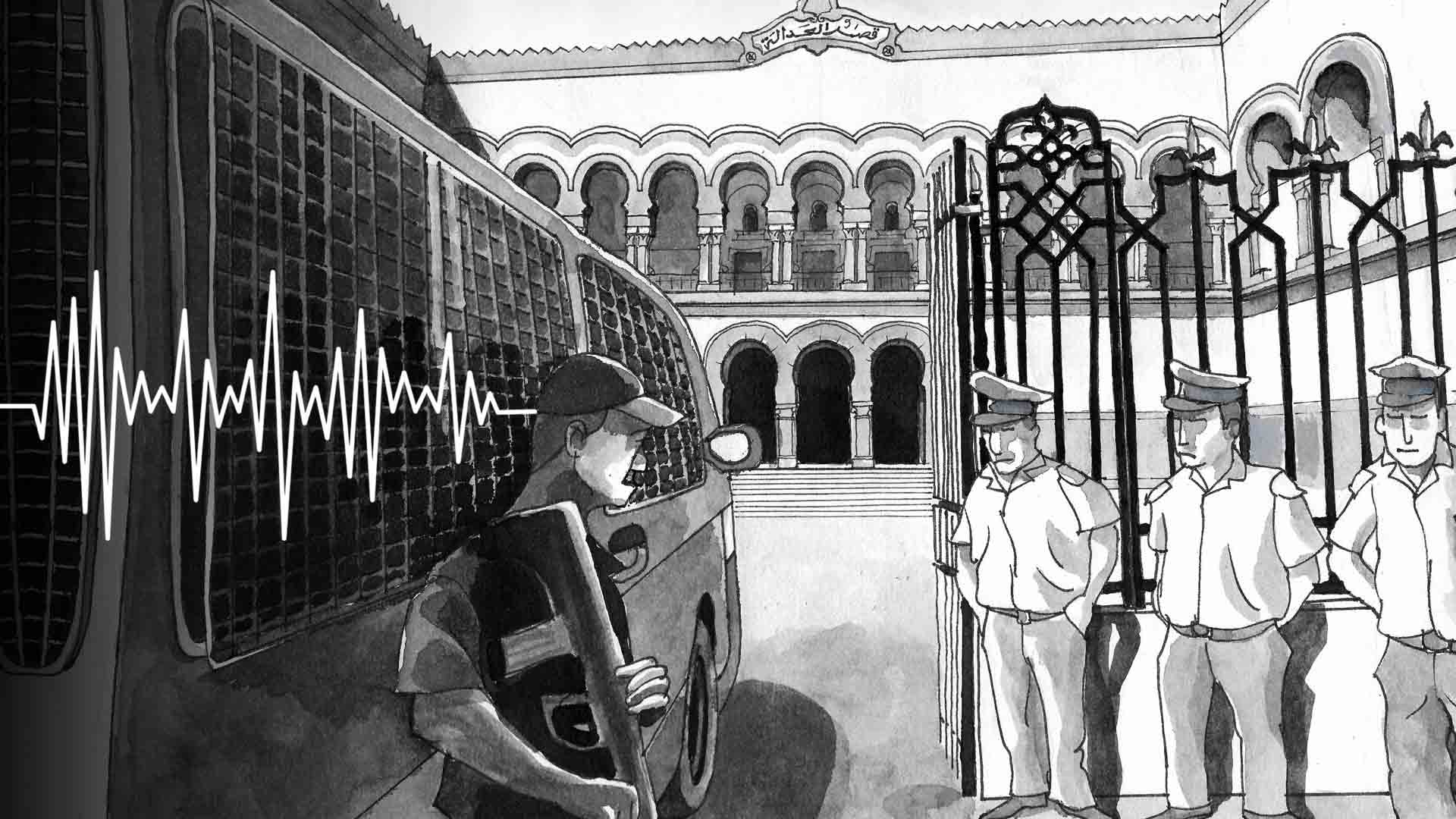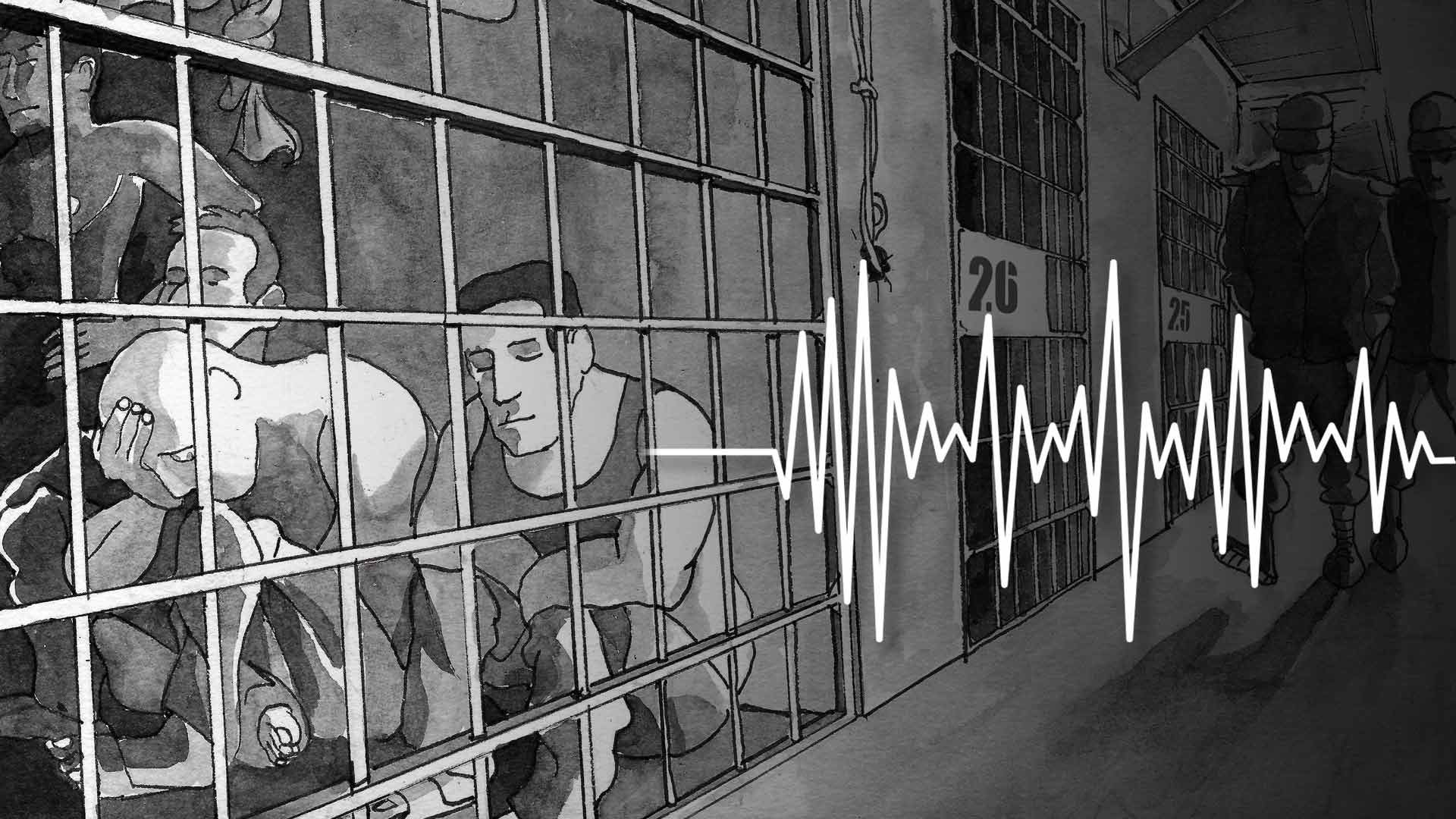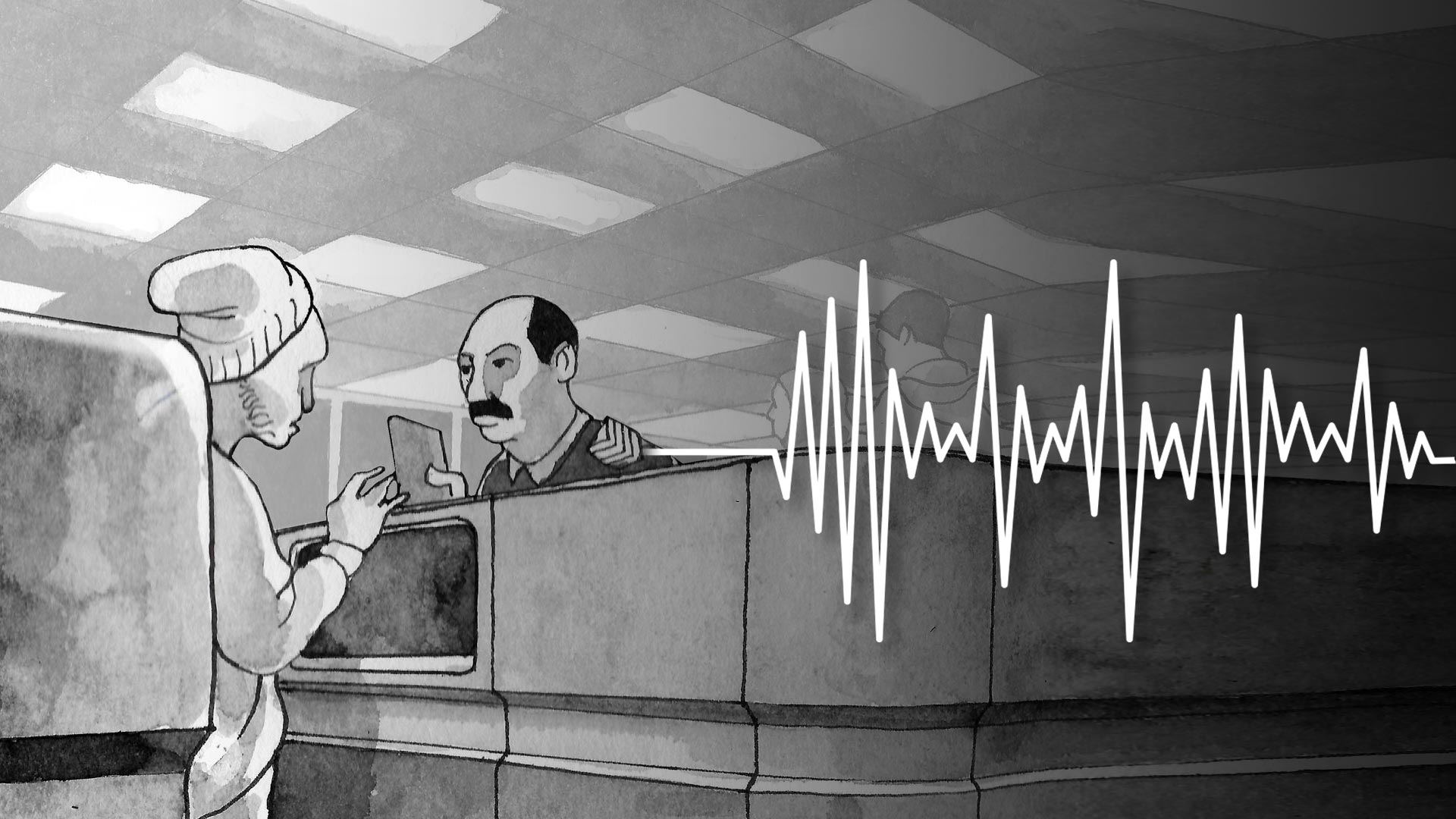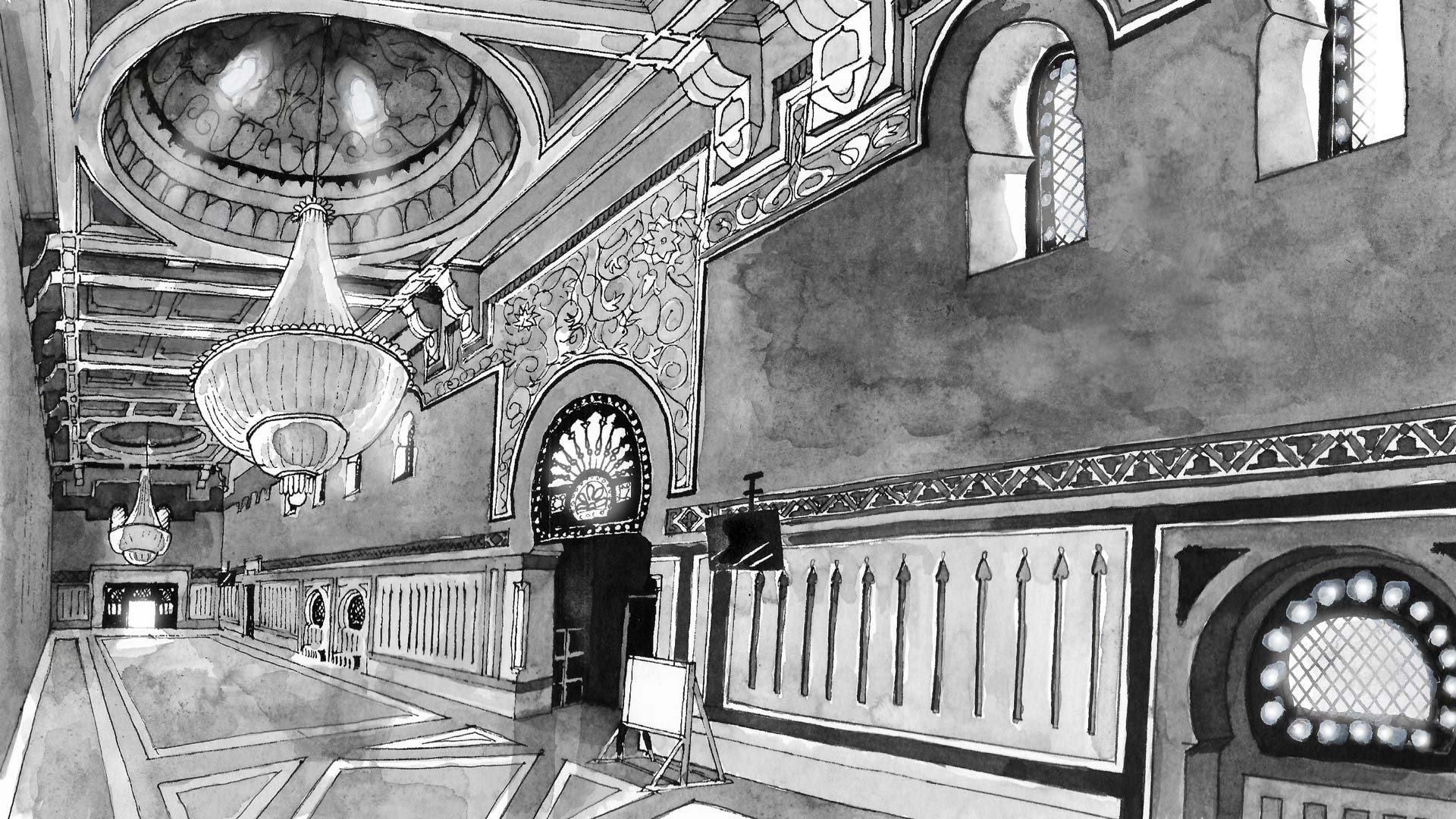The Origins of the Disaster
Following the two terrorist attacks in 2002 and 2007, the propagated image of terrorism not being native to Tunisia was shattered. In 2011, a general amnesty for all political prisoners further contributed to the already fragile security situation. Between political negligence and tightened security, the handling of terrorism-related cases in Tunisia over the past two decades provides necessary insight for understanding the precarious situation today.
21
April
2021
docusonores
[{"user_id":"1448","role":"Illustrations"},{"user_id":"1429","role":"Audio recording"},{"user_id":"1473","role":"Sound Design and Mixing"},{"user_id":"1454","role":"Interviews and Voice-Over"},{"user_id":"1517","role":"Music"},{"role":"Doubling","user_id":"1440"},{"role":"Voice off","user_id":"1303"}]
https://inkyfada.com/wp-content/uploads/2021/04/webdoc-chapitre-2-a-lorigine-du-desastre.mp3
https://inkyfada.com/wp-content/uploads/2021/04/Webdoc-chapitre-2-a-lorigine-du-desastre-ar.srt
https://inkyfada.com/wp-content/uploads/2021/04/chapitre-2-webdoc-FR-srt-1.srt
https://inkyfada.com/wp-content/uploads/2021/05/webdoc-chap-2-en.srt
Le dilemme de la justice antiterroriste | Épisode 2: A l'origine du désastre - معضلة قضاء مكافحة الإرهاب في تونس | الحلقة 2: في أصل الكارثة
Épisode 2: A l'origine du désastre - الحلقة 2: في أصل الكارثة
Depuis l’attentat de la Ghriba en 2002 puis l’attaque de Soliman en 2007, la propagande présentant la Tunisie comme étrangère au phénomène extrémiste a volé en éclats. En 2011, l’amnistie générale de tous·tes les prisonnier·es politiques, dont les attaquants de Soliman, a contribué à la fragilité sécuritaire. Entre laxisme politique et resserrement sécuritaire, le traitement des affaires liées au terrorisme en Tunisie ces deux dernières décennies, donne un éclairage nécessaire pour comprendre les problématiques actuelles.
منذ هجوم الغريبة سنة 2002 والذي تلاه اعتداء سليمان في 2007، انهارت صورة تونس كدولة في منأى عن ظاهرة التّطرف. وفي سنة 2011، ساهم العفو العام الذي شمل جميع السجناء والسّجينات السياسيين·ـات، ومنهم مهاجمو سليمان، في هشاشة الوضع الأمني. ومن شأن قراءة في أساليب التعاطي مع القضايا المرتبطة بالإرهاب في تونس على مدى العقدين الماضيين، والذي تراوح بين التراخي السياسي والتشديد الأمني، أن يساعدنا على الإلمام بالإشكاليات الرّاهنة
38768
Created by
Christophe Cotteret
Illustrations
_Z_
Audio recording
Bochra Triki
Sound Design and Mixing
Oussema Gaidi
Interviews and Voice-Over
Christophe Cotteret
Music
Omar Aloulou
Doubling
Maher Dhahbi
Voice off
Monia Ben Hamadi
Two days before the September 11 attacks in New York 2001, Commander Massoud was assassinated in Afghanistan. The identity of the suicide bombers was quickly revealed to be Tunisian members of al-Qaeda.
In this second chapter, Christophe Cotteret takes us back to the origins of the jihadist movement's formation in Tunisia.
Interspersed with statements from lawyers and judges specialised in antiterrorism, the episode takes a look at the role of Ennahda and the birth of Ansar Al-Sharia, a movement which until 2013 had become the main promoter, trainer and organiser of networks
for young Tunisian jihadi trainees heading to conflict zones.
How did the Tunisian state respond to this internal threat?
"
The new security apparatuses weren't prepared for this, and neither was the judicial system. Meanwhile, terrorism was spreading."
This audio documentary in five chapters is an unprecedented dive into the workings of the Tunisian antiterrorist justice. As an extention of the documentary "Daech, the dilemma of justice", it compiles more than two years of investigations and interviews in an attempt to shed light on the issues facing the antiterrorism system in Tunisia.
Latest episodes
Those accused of terrorism are often given ‘preferential treatment’, a.k.a. brutal arrests, torture, systematic incarceration in degrading conditions regardless of the severity of the offence, etc. When they are subsequently thrown into prison without being distinguished from ordinary prisoners, a radicalisation machine is set in motion inside the prison cells.
Should Tunisian ex-combatants of the Islamic State be repatriated in order to be judged? This is a divisive issue in Tunisia. Given the differing estimates, it would be tricky to try to present an exact number of potential returnees, thus the National Security Council has decided that for the time being, only a few individuals will be repatriated. However, the challenge remains in the inability to guarantee a fair trial.
Inside courtroom No. 6, the defendants respectively appeared before the judges and lawyers, as their families anxiously looked on. It was here that the hearings, condemning hundreds of suspects for being directly or indirectly linked to terrorism, were endlessly held. These young people embodied the consequences of the painful debate concerning the Tunisian justice system, security institutions, and public opinion.
ABOUT
Inkyfada Podcast is the first platform entirely dedicated to original Tunisian podcasts, and was conceived by Inkyfada media in collaboration with the in-house research and development laboratory, InkyLab.
Inkyfada joined the global podcast boom in 2017, when the team produced the first Tunisian audio documentary, diving deep into the belly of the El Kamour struggle taking place in the desert.
Since then, Inkyfada Podcast has produced a wide variety of documentaries, investigations, and podcast series, as well as articles accompanied by music; covering a multitude of contemporary issues in order to offer an immersive and alternative podcast experience.
Whilst exclusively offering audio content, the Inkyfada Podcast team upholds the same core values and principles of inkyfada.com, and is committed to producing high quality content though a dynamic and meticulous production process.
In addition to the permanent team, Inkyfada podcast works closely with various journalists, artists, illustrators, musicians and other content creators in order to diversify the platform and support artistic creativity.
These podcasts differ from traditional radiophonic content in that the applied production and editing process is more akin to cinematographic techniques, in addition to being web-based, downloadable and accessible on demand.
Additionally, Inkyfada Podcast uniquely offers subtitles in French, Arabic and English for all audio content, the majority of which is recorded in Tunisian or in the preferred language of the speaker in question.
More information
SUBSCRIBE
Our podcasts are also available on:


NEWSLETTER
Subscribe to our newsletter and receive the latest updates.
Your email address is only used to send you inkyfada podcast newsletters. You can use the unsubscribe link integrated in the newsletter at any time.




